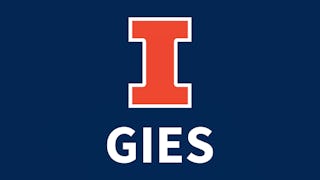This course provides a rigorous, but straightforward, introduction to the key concepts of financial understanding. Using real-world case studies and practitioner interviews, as well as timely knowledge checks, you will integrate your new knowledge and problem solving skills with practical application.



Foundations of Finance
Ce cours fait partie de Spécialisation Principles of Financial Leadership
Enseigné en Français (doublage IA)
6 655 déjà inscrits
Inclus avec
(27 avis)
Expérience recommandée
Compétences que vous acquerrez
- Catégorie : Cash Flows
- Catégorie : Investment Management
- Catégorie : Financial Statements
- Catégorie : Financial Acumen
- Catégorie : Risk Management
- Catégorie : Business Ethics
- Catégorie : Financial Management
- Catégorie : Return On Investment
- Catégorie : Financial Reporting
- Catégorie : Stakeholder Management
- Catégorie : Financial Planning
- Catégorie : Business Risk Management
- Catégorie : Cash Flow Forecasting
- Catégorie : Finance
Détails à connaître

Ajouter à votre profil LinkedIn
juin 2025
6 devoirs
Découvrez comment les employés des entreprises prestigieuses maîtrisent des compétences recherchées

Élaborez votre expertise du sujet
- Apprenez de nouveaux concepts auprès d'experts du secteur
- Acquérez une compréhension de base d'un sujet ou d'un outil
- Développez des compétences professionnelles avec des projets pratiques
- Obtenez un certificat professionnel partageable

Il y a 6 modules dans ce cours
Inclus
2 lectures1 sujet de discussion
Money is a short term store of value, in the form of a promise to pay the bearer on demand. While money used to be backed by silver or gold, modern money has no inherent value. Its value derives instead from the trust and the confidence that its users have toward issuer of the promise to pay – usually a central government. Financial capital is a longer term store of value, usually in the form of a promise to pay later. Financial capital may be backed by other assets, but not always. Whether or not the financial capital is backed by other assets, trust toward its issuer is a fundamentally important component of its value. High levels of well-founded confidence are essential in a modern economy.
Inclus
10 vidéos4 lectures1 devoir
Cash is an enormously important asset for most organisations and individuals, most of the time. The less cash we have, the more important it becomes. If we run out of short term cash to pay our liabilities we can go bust, even if we still have value tied up in our longer term assets. Cash flows are the changes in our reserves of cash. Cash flow forecasting is making projections of our cash flows and cash reserves, and taking timely action to cover potential shortfalls. Related cash flow statements are a key building block of financial reporting.
Inclus
7 vidéos3 lectures1 devoir1 sujet de discussion
External financial reports are accounts – also known as financial statements – prepared by the managers of organisations to answer the legitimate questions of different stakeholders in the organisation’s activities. Stakeholders in companies include its owners (shareholders) who want to know, “What have you managers been doing with our money and our other assets?” Other stakeholders include tax authorities, who want to know, “How much tax should the company be paying?” External financial statements are produced in standard formats, including cash flow statements, balance sheets, income statements and other information. Internal financial reports will – ideally – include all the other information the managers need to run the business from day to day, as well as strategically.
Inclus
12 vidéos5 lectures1 devoir1 sujet de discussion
Investors in financial capital include depositors in banks, lenders, and shareholders. In all cases the investor wants their original invested capital to be safe. They also expect a surplus on top of the amount they originally invested. This surplus is known as a return, often expressed as an annual percentage rate of return, to enable comparisons between different capital assets. Interest is one form of return, generally calculated as a percentage of the amount originally deposited, loaned or borrowed – or sometimes on an accumulating balance rolling up over time, or on a reducing balance being paid off over time. Interest is a form of income. Total returns may include capital gains as well as income. Returns can be negative, as well as positive.
Inclus
12 vidéos4 lectures1 devoir
For investors in organisations, key risks they are concerned about include: losses in the capital value of their invested money, and reductions in the returns that they expected when they made their investments. Managers have fiduciary and stewardship responsibilities for the owners’ assets that they are managing on their behalf. This includes responsibilities for identifying, responding to, and reporting on the significant risks to which the organisation is exposed. Managers also have responsibilities to wider – and longer term – stakeholder interests.
Inclus
9 vidéos5 lectures2 devoirs1 sujet de discussion
Obtenez un certificat professionnel
Ajoutez ce titre à votre profil LinkedIn, à votre curriculum vitae ou à votre CV. Partagez-le sur les médias sociaux et dans votre évaluation des performances.
Instructeur

Offert par
En savoir plus sur Finance
 Statut : Essai gratuit
Statut : Essai gratuitUniversity of Cambridge
 Statut : Essai gratuit
Statut : Essai gratuitUniversity of California, Irvine
 Statut : Essai gratuit
Statut : Essai gratuitUniversity of Pennsylvania
 Statut : Prévisualisation
Statut : PrévisualisationUniversity of Illinois Urbana-Champaign
Pour quelles raisons les étudiants sur Coursera nous choisissent-ils pour leur carrière ?





Ouvrez de nouvelles portes avec Coursera Plus
Accès illimité à 10,000+ cours de niveau international, projets pratiques et programmes de certification prêts à l'emploi - tous inclus dans votre abonnement.
Faites progresser votre carrière avec un diplôme en ligne
Obtenez un diplôme auprès d’universités de renommée mondiale - 100 % en ligne
Rejoignez plus de 3 400 entreprises mondiales qui ont choisi Coursera pour les affaires
Améliorez les compétences de vos employés pour exceller dans l’économie numérique
Foire Aux Questions
To access the course materials, assignments and to earn a Certificate, you will need to purchase the Certificate experience when you enroll in a course. You can try a Free Trial instead, or apply for Financial Aid. The course may offer 'Full Course, No Certificate' instead. This option lets you see all course materials, submit required assessments, and get a final grade. This also means that you will not be able to purchase a Certificate experience.
When you enroll in the course, you get access to all of the courses in the Specialization, and you earn a certificate when you complete the work. Your electronic Certificate will be added to your Accomplishments page - from there, you can print your Certificate or add it to your LinkedIn profile.
Yes. In select learning programs, you can apply for financial aid or a scholarship if you can’t afford the enrollment fee. If fin aid or scholarship is available for your learning program selection, you’ll find a link to apply on the description page.
Plus de questions
Aide financière disponible,

